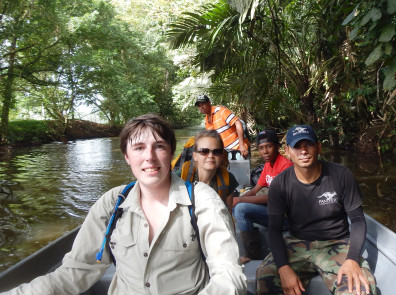King, Niedermeyer garner distinguished awards
Erica Austin and Ron Mittelhammer
The big cats Travis King studies in Central America are highly reclusive, and rarely seen while the sun is up. For years, the distinguished scholarships King sought, were similarly hard to track down.
But through persistence and thanks to a great supporting team at WSU that includes the Distinguished Scholarship Program, King will pursue his passion for researching jaguars, tayras, and ocelots as a Fulbright scholar.
King received not only a Fulbright award, but also a Kaplan Graduate Award and a National Science Foundation Graduate Research Fellowship, all within 48 hours last week. He plans to use the awards to help fund a research and community education project in Honduras, beginning in 2017.
Senior Justin Niedermeyer also landed a Fulbright award, and in September, he will begin graduate coursework and a 10-month research assistantship in Germany. In the fall of 2017, Niedermeyer will attend the University of Colorado, Boulder for doctoral studies in physics, specializing in ultracold atomic physics. He’s gained invaluable experience as an undergraduate, working with WSU professor Peter Engels.
Others interested in the Fulbright program can find out more at Thursday’s Fulbright Academy Forum.
King worked relentlessly for the opportunity to camp out in remote jungles for weeks at a time, collecting hair and scat from some of the world’s most elusive mammals in order to learn more about the best ways to protect their habitat.
He began seeking research opportunities almost immediately when he arrived in Pullman from Dickinson, North Dakota as a freshman. He sought out Sarah Ann Hones, then-director of the Distinguished Scholarships Program. Hones retired late last year, shortly after King had submitted his Fulbright application. He had been unsuccessful with his previous application, but he made adjustments until it was perfect and he shared the great news with Hones last week.
“I was denied last year, but I understood I was on the right track, and just need to focus a bit more and improve my application,” says King, who is now pursuing his Master’s in Natural Resource Sciences. “Even thought I didn’t get big (scholarships) early on at WSU, every step gave me more opportunities and experience. Even though some doors closed for me, the knowledge was not lost.”
King credits many faculty and staff members for helping him excel at WSU. Robert Wielgus, from the Large Carnivore Conservation Lab served as a mentor and offered King his first chance to do research as an undergrad. He connected with Daniel Thornton, who runs the Mammal Spatial Ecology and Conservation Lab, and Thornton helped set him up with an undergraduate research project in Costa Rica. King worked with Marcella Kelly, a professor at Virginia Tech, on a jaguar monitoring project in Belize and his passion was stoked even further.
“I was able to get my foot in the door, and I used that to open up other opportunities,” King says. “I knew I wanted to get involved in research with some kind of terrestrial animal and I just wanted to find an area where I could make a difference.”
Hones and Mary Sanchez-Lanier, Assistant Vice Provost for Undergraduate Education, both encouraged King in his quest for scholarships and awards to fund his research.
“Travis was a very ambitious, enthusiastic student and when he applied for his first distinguished scholarship, he wound up not getting it,” Sanchez-Lanier says. “But (Hones) continued to meet with him and last year they really hit the mark. It’s an evolution – you learn a little bit about how to apply and having the support of the institution behind you is very important. I think the support helped him formulate his plan for excellence and helped him navigate what can be a bumpy road.”
April Seehafer succeeded Hones following her retirement and she says beyond assisting students in applying for distinguished scholarships, her program serves a broader purpose.
“They appreciate the support in the immediate sense, but what they discover about themselves through the process is just as important,” Seehafer says. “The scholarship money and recognition are great (recipients are featured in the Distinguished Scholars Lounge in the CUB), but it’s all about the students and the direction they’re going.”
King’s project in Honduras next year will involve training local guides and rangers in how to collect data, collecting samples himself, and educating the communities that may interact with big cats about the research and why it’s important. It’s an ambitious project with many components, but like his journey at WSU, King says perseverance and learning from mistakes will make the difference.
“Every experience I had in the application process gave me a bit of knowledge and when something didn’t work out I just tried to build from it,” King says. “I think everyone should try to apply, to go through that process and then see how you can build upon it.”